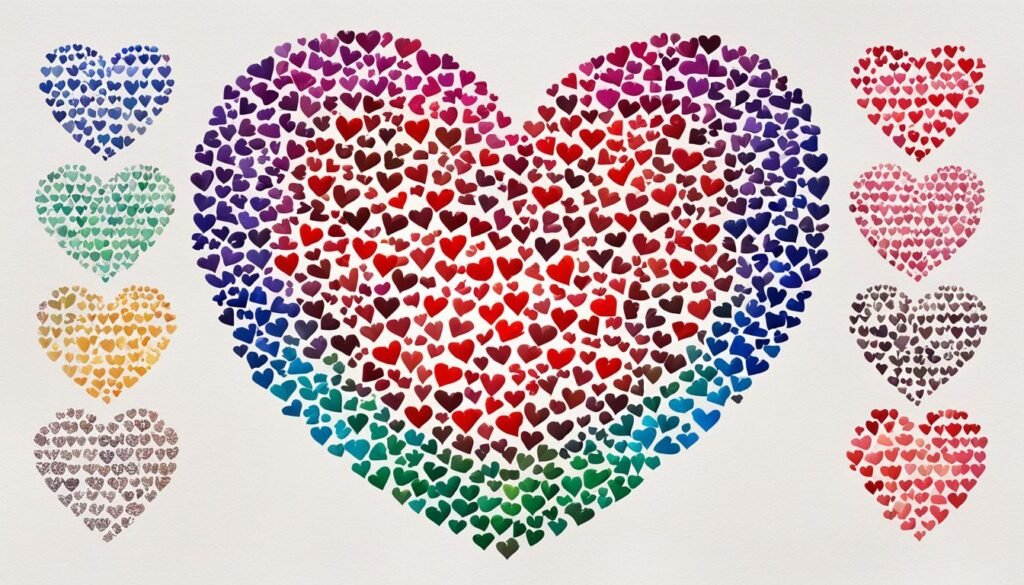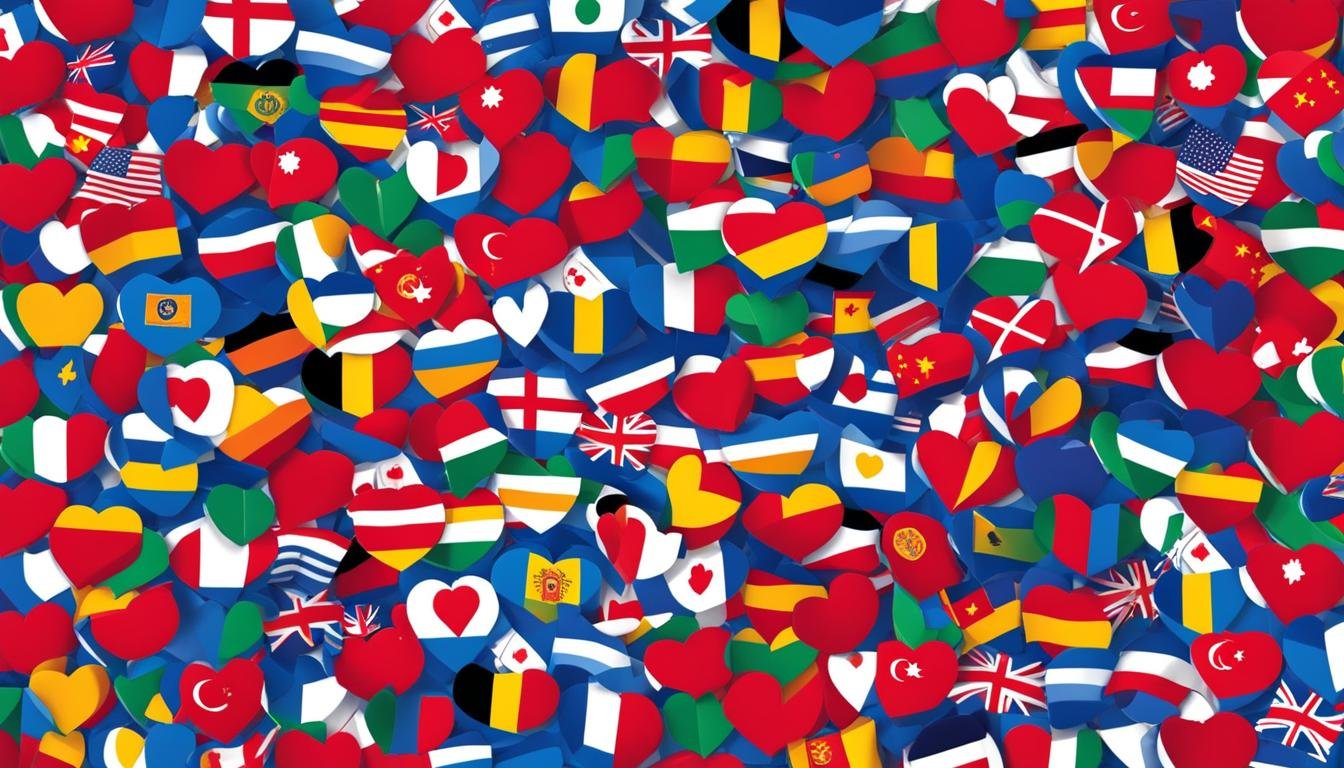Love is a language that everyone can understand, but expressing it in different languages adds a new dimension to it. Imagine impressing your loved one by saying “I love you” in their native language! In this article, we’ll explore how to say “I love you” in different languages, as well as some romantic phrases that will make your partner’s heart melt.
Key Takeaways
- Learning how to express love in different languages is a beautiful way to connect with your significant other on a global level.
- There are various translations of “I love you” in different languages.
- Understanding the cultural significance behind love expressions can deepen our appreciation for these phrases.
- Expressing love in different languages is a heartfelt way to show that your affection knows no bounds.
- Exploring different romantic phrases from around the world can add a new dimension to your relationship.
Translations of “I Love You” in Different Languages
Expressing love in different languages can be a truly romantic gesture. Learning how to profess love in multiple languages is a wonderful way to show your significant other how much they mean to you.
Here are some ways to say “I love you” around the world:
| Language | Translation |
|---|---|
| French | Je t’aime |
| Italian | Ti amo |
| Spanish | Te quiero / Te amo |
| German | Ich liebe Dich |
| Japanese | Aishiteru |
| Korean | Saranghae |
| Portuguese | Eu te amo |
| Russian | Я тебя люблю (Ya tebya lyublyu) |
| Swahili | Nakupenda |
Expressing love in various languages adds a touch of unique charm to your relationship. With these translations of “I love you” in different languages, you can impress your partner and deepen your connection with them.

The Cultural Significance of Love Expressions
Expressions of love vary significantly between cultures, each reflecting the unique values, beliefs, and traditions of that society. Understanding the cultural significance behind love expressions can provide valuable insights into different cultures’ attitudes towards love.
In some societies, expressing love openly may be seen as taboo or reserved for specific contexts, such as marriage. For instance, in Japan, the phrase “ai shiteru” is reserved for a lifetime commitment and is not used freely by couples. On the contrary, in Latin America, people openly express their love through physical affection and romantic gestures.
Additionally, the words and phrasing used to express love can vary widely between cultures, with some languages offering intricate and poetic expressions. For example, in French, “Je t’aime” is a simple yet elegant declaration of love, while in Italian, “Ti amo” is reserved for only the most significant and profound expressions of love.
Overall, learning about the cultural significance of love expressions in different societies can help individuals appreciate the diversity of cultures and deepen their understanding of the complexities that surround love expressions.
Examples of “I Love You” in Different Languages:
| Language | Phrase |
|---|---|
| French | “Je t’aime” |
| Spanish | “Te quiero” |
| Italian | “Ti amo” |
| Arabic | “Ana Behibak” |
| Mandarin | “Wo ai ni” |

Conclusion
Expressing love is a universal language that knows no boundaries. Saying “I love you” in different languages is a beautiful way to connect with your loved one and embrace the diversity of cultures. By learning how to profess love in multiple languages, you can express your affection in a unique and meaningful way.
So, go ahead and explore the translations of “I love you” in different languages. Discover romantic phrases from around the world and gain a deeper understanding of the cultural significance behind these expressions of love. Whether you choose to say “Je t’aime” in French, “Ti amo” in Italian, or “Mahal kita” in Tagalog, the sentiment remains the same: expressing love globally is a beautiful way to create a deeper, more meaningful connection with your loved one.
FAQ
How do you say “I love you” in different languages?
To say “I love you” in different languages, you can use the following phrases:
- I love you (English)
- Je t’aime (French)
- Ich liebe dich (German)
- Ti amo (Italian)
- Te amo (Spanish)
- Eu te amo (Portuguese)
- Ik hou van je (Dutch)
- Aishiteru (Japanese)
- Saranghae (Korean)
- Wo ai ni (Mandarin Chinese)
How can I express love in different languages?
Apart from saying “I love you,” you can use other romantic phrases in different languages to express your love. Some examples include:
- You are the love of my life
- You make me happy
- You complete me
- You are my soulmate
- My love for you is eternal
- I adore you
- You are my everything
- You are the most beautiful person in the world
What is the cultural significance of love expressions?
Love expressions hold deep cultural significance. They reflect the values, traditions, and beliefs of different societies. In some cultures, love expressions are highly poetic, while in others, they are more direct. They play a vital role in courtship rituals, marriage ceremonies, and daily expressions of affection. Love expressions often symbolize commitment, loyalty, and emotional connection, and they contribute to the overall richness of a culture’s language and traditions.
Why is it important to learn how to say “I love you” in different languages?
Learning how to say “I love you” in different languages allows you to connect with people of diverse backgrounds and show your love and affection in a meaningful way. It demonstrates your willingness to embrace different cultures and languages, and it can be a beautiful gesture to surprise your partner or loved one with a heartfelt message in their native language. Expressing love in various languages expands your understanding of different cultures and promotes global unity through the language of love.
Are there any other romantic phrases I can learn in different languages?
Definitely! In addition to “I love you,” there are numerous romantic phrases you can explore in different languages. Some examples include:
- You are my sunshine
- You are the light of my life
- Forever yours
- I can’t live without you
- You stole my heart
- Your love completes me
- You are the reason I smile
- I am crazy about you
Remember, love is a universal language, and expressing your feelings in different languages adds an extra touch of romance and appreciation.

